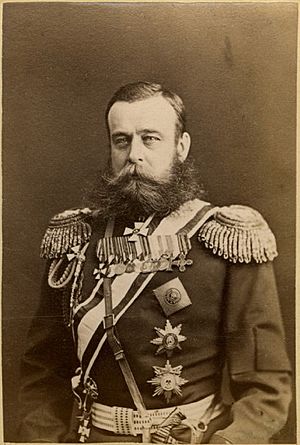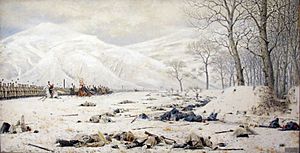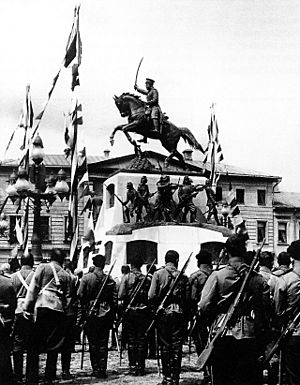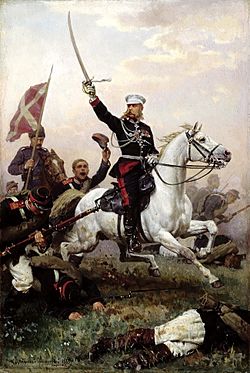Mikhail Skobelev facts for kids
Quick facts for kids
Mikhail Dmitriyevich Skobelev
|
|
|---|---|

Mikhail Skobelev
|
|
| Nickname(s) | White General White Pasha Bloody Eyes |
| Born | 29 September 1843 Saint Petersburg, Russian Empire |
| Died | 7 July 1882 (aged 38) Moscow, Russian Empire |
| Allegiance | |
| Service/ |
|
| Years of service | 1861–1882 |
| Rank | General of the Infantry |
| Commands held | 4th Army Corps (Russian Empire) |
| Battles/wars | January Uprising Russo-Turkish War |
| Awards | Order of St. George Order of St. Vladimir Order of Saint Anna |
Mikhail Dmitriyevich Skobelev (born September 29, 1843 – died July 7, 1882) was a famous Russian general. He was known for his military victories in Central Asia and his bravery during the Russo-Turkish War of 1877–1878.
Skobelev was often seen wearing a white uniform and riding a white horse. He was always in the middle of the fighting. Because of this, his soldiers called him the "White General." People from Turkey called him the "White Pasha," which is a high title. During a campaign in Khiva, his opponents, the Turkmen, called him goz ganly, meaning "Bloody Eyes." A famous British military leader, Bernard Montgomery, once said Skobelev was one of the best commanders of his time. He described him as a "skilful and inspiring" leader.
Contents
Who Was Mikhail Skobelev?
Mikhail Skobelev was a very important military figure in Russian history. He was known for his daring tactics and for leading his troops from the front. His actions helped expand the Russian Empire and changed the map of Central Asia.
Early Life and First Adventures
Mikhail Skobelev was born in Saint Petersburg, Russia, on September 29, 1843. His mother, Olga Skobeleva, was a kind person who helped others. His father, Dmitry Ivanovich Skobelev, was also a general.
After finishing his studies at the General Staff Academy, Skobelev became a staff officer. In 1868, he was sent to Turkestan, a region in Central Asia. He spent many years there, except for two years when he worked in the Caucasus region.
During the Khivan campaign of 1873, Skobelev led a group of soldiers. They marched through a difficult desert to capture the capital city of Khiva. He played a big part in this victory. Later, he even dressed up as a Turkoman to explore a dangerous area. In 1875, he led another important mission against the Khanate of Kokand. He showed great skill in battle, capturing many guns and defeating a larger enemy force with only a few cavalry soldiers.
Heroism in the Russo-Turkish War

After his successes, Skobelev was promoted to major-general. He received the Order of St George, a high military award. He also became the first governor of the Ferghana Oblast, a region in Central Asia.
In 1877, the war with Turkey began. Skobelev quickly showed his bravery. In April, he captured a bridge over the Siret. In June, his troops crossed the Danube River.
The Siege of Pleven
Skobelev led the Cossack Brigade in an attack during the second battle of Pleven. This was a very tough fight. His division attacked a strong enemy fort called the Grivitsa redoubt. Even though some parts of the Russian army had success, the Ottoman forces pushed back all attacks. Many soldiers were lost on both sides.
At the Battle of Lovcha on September 3, Skobelev again proved his courage. He fought fiercely on the Green Hills during the third battle of Pleven. He managed to capture two southern forts. The next day, the Turks tried to take them back but could not. The fighting was very intense, and many lives were lost.
Skobelev was then promoted to lieutenant-general. He took command of the 16th Division. He helped surround Pleven, and on December 9, the Ottoman general Osman Pasha surrendered with his army. In January 1878, Skobelev led his troops across the difficult Balkan Mountains in a snowstorm. He defeated the Turks at Sheynovo, near Shipka, capturing many soldiers and guns.
Conquering Central Asia
After the war, Skobelev returned to Turkestan. In 1880 and 1881, he gained more fame by dealing with the Tekke Turkomans. After a long siege, Skobelev's forces captured the fort of Geok Tepe. This battle was very costly, with many Turkmen soldiers and civilians losing their lives. This defeat broke the Turkmen resistance. It led to the region being added to the Russian Empire.
Because of the high number of casualties at Geok Tepe, Skobelev was removed from his command. He was planning to advance further into the region but was called back to Moscow. The official reason was to calm down public opinion in Europe about the severe losses. Some people also thought he was becoming too involved in politics. He was then given command in Minsk.
Later Life and Legacy
In his final years, Skobelev became very active in politics. He strongly supported Russian nationalism, which is a deep love for one's country. He also supported Pan-Slavism, an idea to unite all Slavic peoples. He even spoke in Paris and Moscow in early 1882, talking about future conflicts between different groups. He was quickly called back to Saint Petersburg.
Mikhail Skobelev died suddenly of a heart attack on July 7, 1882, in Moscow. He was only 38 years old and very active. Because he was so popular, his sudden death made many people suspicious. Russia lost a great military leader with his early death. This became clear during the Russo-Japanese War of 1904–05, when Russia's generals did not have his special skills or inspiring leadership.
Awards and Recognition
After Skobelev's death, he was honored in many ways. In Moscow, a monument was built for him on a main square. The town of Fergana in Uzbekistan was even renamed Skobelev.
Today, his name is still remembered, even outside Russia. In Pleven, Bulgaria, a park called Skobelev Park was built on one of the hills where major battles took place. This park has a huge 360-degree painting called the Panorama Pleven's Epopee 1877. In one scene, the "White General" is shown bravely leading a Russian attack. A main street in Sofia, the capital of Bulgaria, is also named after Mikhail Dmitriyevich Skobelev.
At the entrance of Skobelev Park, there is a statue of the famous general. The park also has memorials with the names of Russian and Romanian soldiers who died fighting for Pleven's freedom. It is decorated with old cannons, cannonballs, and rifles donated by Russia.
- Russian awards
- Order of St. Stanislaus, 1st class with swords
- Order of St. Anna. 1st and 4th classes
- Order of St. George, 2nd, 3rd and 4th classes
- Order of St. Vladimir, 3rd class with swords
- Gold Sword for Bravery
- Gold Sword for Bravery with diamonds
- Gold Sword for Bravery with diamonds for the transition of the Balkans
- Foreign awards
- Order of the Red Eagle, 1st and 2nd class with swords (Prussia)
- Pour le Mérite (Prussia)
- Grand Cross of the Order of the Cross of Takovo (Serbia)
- Order of the Cross of Takovo with swords (Serbia)
- Serbian Gold Medal for bravery
- Montenegrin Medal
- Romanian medal for military valour
See also
 In Spanish: Mijaíl Skóbelev para niños
In Spanish: Mijaíl Skóbelev para niños
 | Roy Wilkins |
 | John Lewis |
 | Linda Carol Brown |



